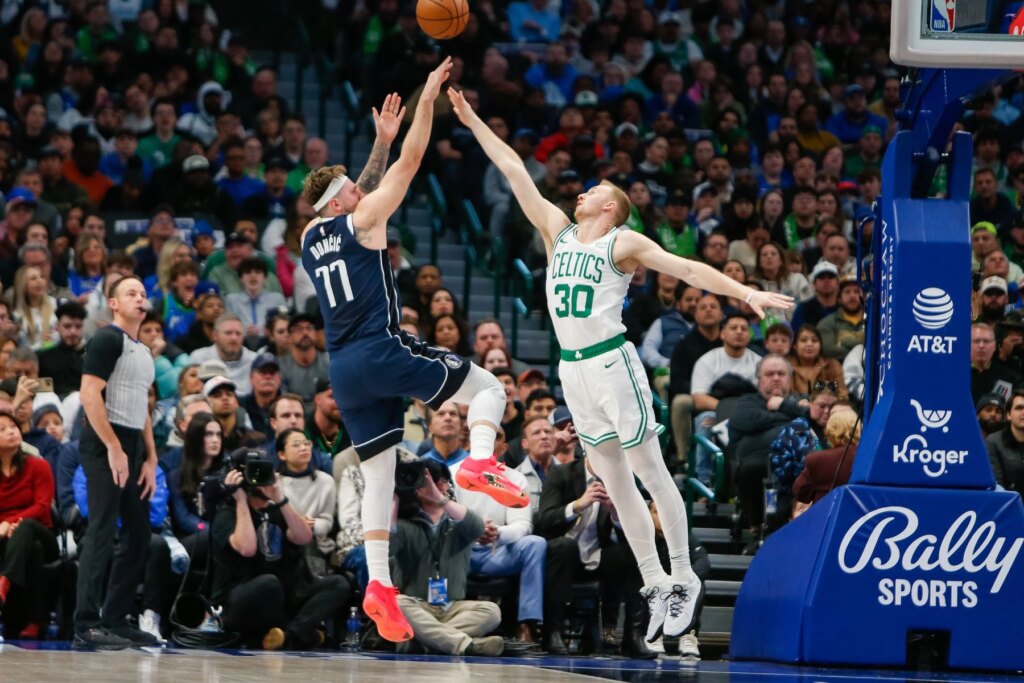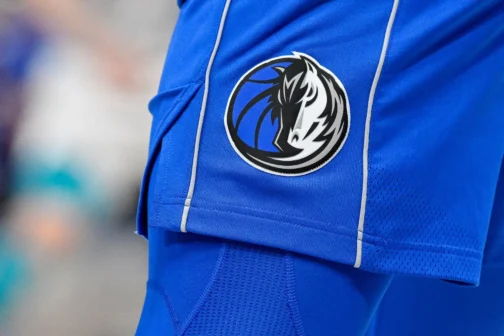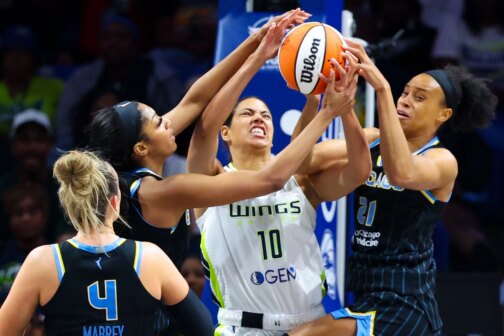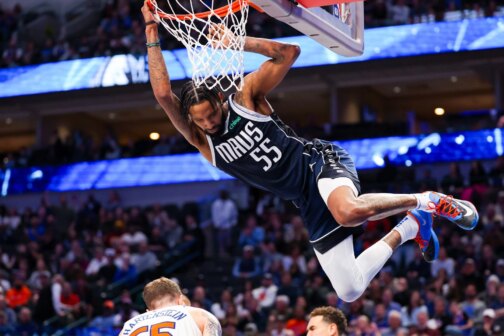Luka Doncic wanted to set the tone in Game 5 of the Western Conference Finals against the Minnesota Timberwolves. His 10 points in the first 2:33 did just that, and the Mavericks never looked back. He is “that guy,” and he proved it by putting the team on his back to start the game. Then Kyrie Irving joined the party and matched Doncic’s 36 points to lead Dallas to a series-clinching victory. But that celebration is over. Now it’s time to look ahead to Dallas’ greatest test of all in this unexpected, thrilling run.
The 2023-24 Boston Celtics are great. Like, historically great. Their 64 wins were seven more than any other team. They sported a 11.7 net rating in the regular season, better than the legendary 73-win Warriors in 2016 and the best since the equally legendary ’98 Bulls (11.8). They have the best top six in the game, and you can’t double any of them because they all shoot the three without compromising anything on the defensive end. The Celtics had the best offense and took care of the ball better than anyone. They attempt (42 per game) and make (16.5) more 3s than anyone and hit them at a rate that is tops in the league, at 39 percent. To top it off, their defense was second in the regular season with two players (Derrick White and Jrue Holiday) earning second-team All-Defense honors.
There is good reason, in other words, for the Mavs to enter this series as the underdog for the fourth straight time. While Dallas was 21-9 after the trade deadline (which included losses in the last two games where the starters sat), the Celtics were 24-6. Only one team has won the title never having had home-court advantage: the 1995 Houston Rockets, a six seed that took off after the midseason acquisition of Clyde Drexler.
That’s what Dallas is up against. Now the question is whether the Mavericks have a pathway toward beating the odds one last time.
It won’t be easy—but, yes.
Offensively, Dallas will face a defense designed to take away what it is good at: lobs and corner 3s. Ex-Mav Kristaps Porzingis, on track to play for the first time since April 29, figures to guard Derrick Jones Jr., thereby demanding Dallas make a choice. Doncic will want to hunt the Boston bigs, forcing the switch. (Remember Rudy Gobert?) If Doncic brings up Daniel Gafford or Dereck Lively II for the pick-and-roll, Jayson Tatum will come up for the switch. That can unlock lobs on the big-small matchup on the roll, except Porzingis will still be back to provide help at the rim. If Doncic brings up Jones to get Porzingis in the action, the vertical game won’t be as effective as when played with the big men.
Here’s the good news. The Celtics don’t like to trap, so instead of switching, they will play drop coverage with their bigs. Minnesota tried that same strategy and Doncic and Irving cooked them, hitting floaters and mid-range shots, and sucking in the big and then lobbing over him. The Celtics have to throw multiple looks at Doncic, and if they use Tatum and Jaylen Brown on him for extended stretches, it could wear out both players, as we saw with Anthony Edwards.
The difference could be Dallas’ ability to take and make corner 3s. They have to match the Celtics’ firepower from deep. The Mavs were 40 percent from the corners and took the most in the league at 11.3 per game, thanks to the ability of Doncic and Irving to collapse defenses. Meanwhile, the Celtics allowed a league-low 35.2 percent from the corners during the regular season, and that number has dipped to 23.5 percent in the playoffs. Doncic and Irving forcing help on drives will be huge here.
The defensive challenge is stout as well. Boston spreads you out, and when they hit 3s, they win; the Celtics are 27-0 when making 19 or more. They’ll have their chances, too, considering the Mavs have made their name in the playoffs by locking down the paint and taking away driving lanes at the cost of allowing opponents to shoot from distance. In this series, they will see an offensive attack similar to what the Thunder tried, with two key differences working in Boston’s favor: there is no Josh Giddey to hide a center on, and Porzingis hits more shots from deep than Chet Holmgren does. Porzingis and Al Horford can stretch Gafford and Lively to the 3-point line with their pick-and-pop ability, taking away the rim protection that has made Dallas so tough to score against.
Somehow, Dallas must protect the paint while also rotating and closing out on the Celtics’ catch-and-shoot 3-point shooters, who are so deadly from deep. (Holiday and White are second and third, respectively, in catch-and-shoot accuracy in the playoffs.) Maxi Kleber might get some time at the five in games when the Celtics are cooking from beyond the arc so that everything can be switched defensively to stay home on shooters and also take Porzingis away from the rim on the other end of the floor.
But the Mavs have two more factors working in their favor.
First, pace has helped Dallas supercharge an already potent offense. While the Celtics led the league in transition defense during the regular season per Cleaning the Glass (which removes garbage time to avoid skewing the numbers), in the playoffs they are eighth of the 20 teams that made at least the play-in. Finding easy points before the opponent gets set is imperative against an elite defense.
Then there’s crunch time, where Dallas won the Minnesota series. Each of the first four games went down to the end, and the Mavs out-executed their opponent in the initial three games before blowing out the Wolves in Game 5. Dallas boasts the second-best clutch win percentage in the league and the third-best net rating. The Celtics are fourth in both categories.
Clutch, though, is broadly categorized as a game with a five-point margin or less in the last five minutes. My podcast partner, Mavericks TV voice Mark Followill, defines one-possession games in the last two minutes as “super-clutch,” and this is where we see a difference. In the regular season, the Mavs were 18-7 in such games, tops in the league. They shot 56 percent overall and 50 percent from 3. In these high-leverage games, the Celtics were 13-12, good for 14th while shooting just 40 percent overall and 37 percent from 3. The difference? Doncic and Irving’s stellar play combined with timely threes from role players mixed with stout defense. As for the Celtics, they tend to bog down into a “your turn, my turn” style isolation game with Tatum and Brown that can stagnate the offense.
Given all that, what is the mentality for Game 1? The Mavs need to remember the aggression they came out with in the opener against Minnesota. After that historic regular season, the pressure is on Boston in what many are calling a “championship or bust season.” Will the long layoff and relatively easy run through the Eastern Conference playoffs harm them? If the Mavs come out strong, will the Boston crowd get restless knowing their team is 19-15 in its last 34 home playoff games? The Mavs may be underdogs, but they’re familiar with that mindset.
So: push the pace, nail the shots Boston gives up in drop coverage, limit the damage on three-pointers while hitting their own, and out-execute in the clutch. That’s a tough blueprint for the Mavericks to execute, but it is doable, especially with “that guy” wearing their uniform.
Above all else, that might be what matters most.
Author






